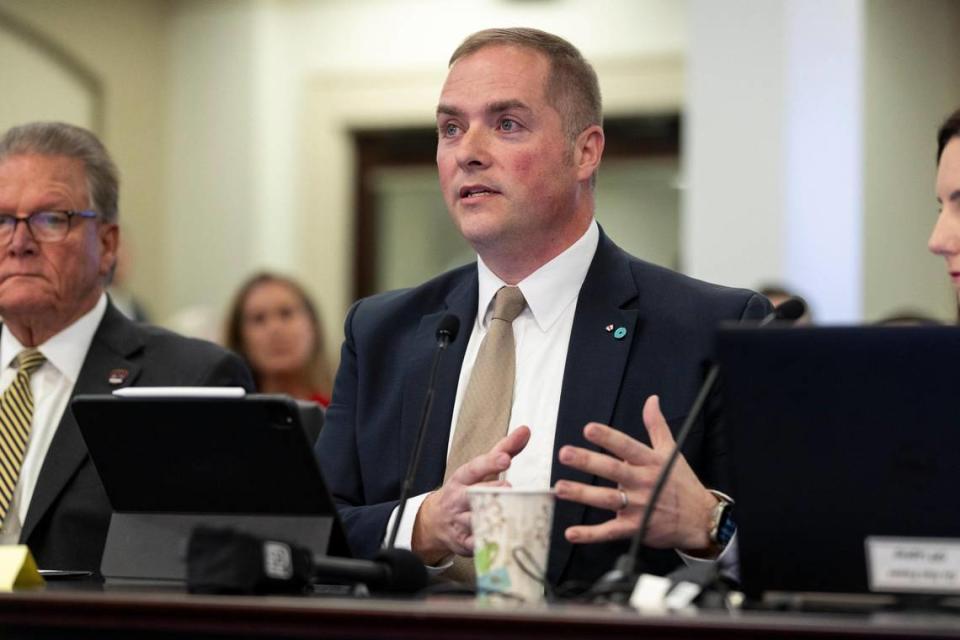‘If not this, then what?’: Advocates make case for crisis gun removal bill in Kentucky
A plan to allow for the temporary removal of guns from Kentuckians who may become violent received its first legislative hearing Friday, offering a glimpse into the intense opposition it is likely to face when the 2024 General Assembly begins in little more than two weeks.
CARR, an acronym for Crisis Aversion and Rights Retention orders, is being carried by Sen. Whitney Westerfield, a Republican from Fruit Hill and the Senate Judiciary Committee chair. Similar legislation elsewhere has been called ERPO, or extreme risk protection orders, or more colloquially — and politically charged — “red flag” laws.
Westerfield has worked up two drafts of the proposal, but the core of both is the same: creating a narrow legal pathway to remove firearms from those who may pose a risk to themselves or others, but in a way that protects people and their constitutional rights.
“I feel compelled to try, and I feel like it’s my obligation,” he said to his peers, “and though I can’t speak for you, I believe it is your obligation, to not be afraid to have difficult conversations about the toughest issues that people of Kentucky face. And this is a tough one.”

The CARR proposal — the draft of which has not yet been publicly published — proved so contentious that two additional committee rooms in the Capitol Annex were needed Friday for overflow attendees, both for and against the measure.
The hearing was for discussion only; no action was taken on the proposal.
Rick Sanders, chief of the Jeffersontown Police Department and former Kentucky State Police commissioner, joined Westerfield in supporting CARR, even as a self-described gun owner and Second Amendment advocate.
“If not this, then what?” he said. “We’ve talked about this for years. Mental illness is something we deal with in law enforcement every day.”
Sanders said he thinks of Louisville Metro Police officer Nickolas Wilt, who was shot in the head while responding to the April mass shooting at Old National Bank downtown.
Wilt, he said, “got a bullet in his head because of somebody suffering from mental illness who had access to a gun. It’s not a gun issue. … There are some people that are going through mental illness episodes that should not have access to guns, should not be allowed to kill themselves or others.”
What are opponents saying?
It is Westerfield’s fellow Republicans — a party that enjoys veto-proof majorities in both the House and Senate — who will be the harshest critics of the legislation, as evidenced by their questions and comments during the committee meeting.
Rep. Steve Rawlings, R-Burlington, said he’s concerned judges would make decisions based on their “personal policy preferences” and that he does not “trust the system” on this issue.
Rep. Savannah Maddox, R-Dry Ridge, asked when law enforcement removes weapons from a home, how will they know where to find them? Will they cut open safes and dig through barns and cars? Do they tear apart the Fourth Amendment, which protects against unreasonable search and seizures, in the process?
Maddox, who has received an award from a gun-rights group for her work in passing permitless carry in Kentucky, has been an especially vocal opponent of Westerfield’s proposal in the run-up to Friday.
“I think the question then leads to where we would be in, potentially, a scenario to have a foot in the door for a registry,” Maddox said at the committee. “And it’s also important to note that there are other folks in that household that are not implicated at all in any of this and have the ability to have their Second Amendment rights infringed upon.”

Rep. Jason Nemes, R-Middletown, asked Westerfield if the bill takes away a constitutional right of someone who has done nothing wrong in the eyes of the law based on a prediction of how they might act.
Westerfield said the process created by the bill is entirely civil, not criminal, and there’s no change to the presumption of innocence. Additionally, Westerfield said there are “limitations even on other bedrock constitutional rights.”
“We’ve seen instance, after instance, after instance, after instance, after instance of someone who is not mentally well, who was, until the moment they snapped and did publicly what they were thinking about and conceiving of doing, lawfully possessed a firearm,” he said.
“I think if — again, I can’t speak for any of you — but if you knew that the shooter at the bank in Louisville in April was gonna go and shoot all those people, if you knew in advance, I don’t think anybody in here would arm him.”
Speaking to reporters after the meeting, Westerfield acknowledged that some of his colleagues are immovable on the subject.
But not all of them. The bill has support among both parties in the Senate, he said, and backers in the House.
“I think there’s more support for it than you’re hearing. I think the voices that are opposed to it are louder than the rest,” Westerfield said. “When it’s a contentious bill, you go to the legislators that have concerns or questions … and talk to them.
“And for those that are naysayers, I’d say, ‘What’s your solution? Do you think it’s okay for someone that’s near a psychotic episode or a break to be armed to the teeth? With no mechanism for government to protect rights and check on things?’ I disagree with that, but if that’s what they want to do, I guess they can own that.”

What’s in the bills?
In the first option, the petitioner who has concerns about an individual must first go to law enforcement and convince them of the threat. The officer will in turn go to the individual who is the subject of the petition and give them two options: keep your guns until a hearing takes place within a set number of hours, or give them up now and have a hearing in a week.
Westerfield says this addresses the concerns about ex parte hearings — a court proceeding without the subject of the petition present — used in similar laws elsewhere.
The second option does use an ex parte hearing for the petition, but still requires the case must first be made to law enforcement about the risk posed, Westerfield said, “so it’s not just anybody on a whim asking for a judge to get your guns.”
Further details about potential guidelines and processes for either option were not discussed at length, and copies of the proposal are not yet available.
Westerfield said the default position is that the guns should not be taken from the respondent in the first place, and upon each review, the burden is placed on the petitioner to back up the case for removal.
While much of the discussion around bills like CARR center on mass shootings, advocates say they are also effective tools in preventing suicides.
Rep. Lindsey Burke, D-Lexington, shared that she tried to kill herself after an acute mental health crisis in college. Had she tried with a firearm, she said she would not be here today.
“Just last week I met a veteran who recently attempted suicide with a firearm, and by the grace of God, he only lost his eye. What he gained was a (new) lease on life, and I’ve never seen someone more invigorated than that man, who is now working on his mental health and getting back on his feet,” Burke said.
Sen. Karen Berg, D-Louisville, said it was one year ago to the day that she woke up to the phone call that her own son had died by suicide. Since then, Berg has started spending her Thursday nights at a support group for survivors of suicide.
“Every one of them with the exception of me — and I thank God every day, every day, I thank God that my child did not put a gun to his head, and God forbid, did not go out and kill somebody else with his suicide, because that’s what most of these school shootings are: they’re public suicides,” she said.
“But I sit and I listen to these parents … describe what it is like to watch your child blow their head off. And it is unfathomable. And if we could do one thing in this state to prevent one parent from having to go through that, it is worth it. Because this is hell. This is hell.”
Help is available. The 988 Suicide & Crisis Lifeline is free, confidential and available 24/7 by call or text. https://988lifeline.org/

